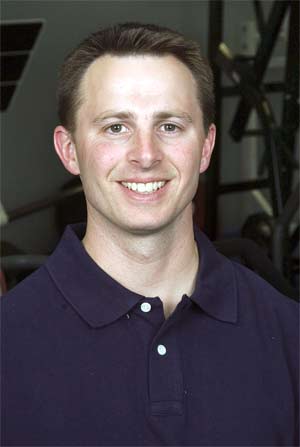 By Cory M. Schidler, B.S., HFI By Cory M. Schidler, B.S., HFIYou may be asking yourself,
fitness required for tournament angling? Yes thatís right: fitness
for tournament angling ó and even more specifically, conditioning
for angling.
Now, I must admit, when I first learned that I would be writing
about such a topic, I was a bit skeptical. I grew up fishing in
eastern Nebraska, and I always thought of fishing as relaxing.
However, I was usually baiting a hook and waiting for a big cat ó
not casting a thousand times trying to hook the biggest bass.
With that in mind, there is a certain level of conditioning in
which a professional angler should take part. Physical conditioning
can help to enhance performance in many ways.
The casting and set arms need to be conditioned to help avoid
inflammation in the muscles and tendons. The lower back and
shoulders need to be strong to avoid aching.
And, overall physical endurance will help keep the angler alert
throughout the fishing tournament.
Nutrition Is First Detail
The very first detail to your physical conditioning program is
nutrition. You need to have the right amount and type of fuel in
your body for optimal performance.
Optimal nutrition will help your body recover after workouts and
will keep high energy levels throughout the tournament. The most
common mistakes I see in nutrition are overeating and/or skipping
meals.
Your calories should be spread out during the day and divided
into five-six meals or snacks. For example: I am a 160-pound, active
35-year-old male. I know I need about 2,200 calories per day to
maintain by current body-fat percentage.
If I divide up the calories throughout the day, I find that I can
have about 500 calories for each breakfast, lunch, and dinner. Also,
I can have about 200 calories for each of three snacks; this keeps
my energy levels up throughout the day.
Second Step Is Cardio
The second step in your anglerís conditioning program is
cardiovascular or aerobic conditioning. Brisk walking, bicycling,
elliptical, running, and the stair stepper are all good examples of
exercises that will help your aerobic conditioning.
You will want to do a minimum of 20 minutes of aerobic
conditioning per workout, three to five times per week. You will
want to get your heart rate to 65 percent of your maximum heart
rate.
To find out what this number is, take 220-your age and then
multiply it by .65. For example: for myself I would take 220 minus
35 which equals 185. I then take 185 times .65 and get 120 beats per
minute, which is where my heart rate needs to be when I am
exercising aerobically.
Next Comes Strengthening
The next step in the anglerís conditioning program is
strengthening muscles. Four exercises come to mind to strengthen all
major muscle groups: Squats, Pushups, Rows, and Crunches. Form is
very important!
If you do not know how to correctly perform these exercises,
please e-mail me or visit my Web site. These exercises should be
done at eight to 12 repetitions per set with one to two sets per
exercise. You should do this workout two to three days per week.
Now You Can Stretch
The last step in your conditioning program is stretching. This is
the most often skipped part of the workout, but often the most
therapeutic. You should stretch all of the major muscle groups.
Areas that need particular attention are the shoulders, the lower
back, and the backs of the legs. Form is very important! Remember,
you can e-mail me or go to my Web site with any questions.
These stretches should be done after your workouts. You should
hold each stretch for 20 seconds and can repeat a second time for
enhanced results.
So, there it is anglers ó your own conditioning program to
enhance your performance on the water. Remember, always consult a
physician or exercise professional before starting an exercise or
nutritional program, learn how to correctly perform exercises to
avoid injury, and work into your exercise program slowly.
Please e-mail me at
cory@CoreFitnessAZ.com if you have any questions or suggestions
on topics related to fitness that you would like to learn about in
upcoming issues.
|
 August
2006
August
2006 August
2006
August
2006